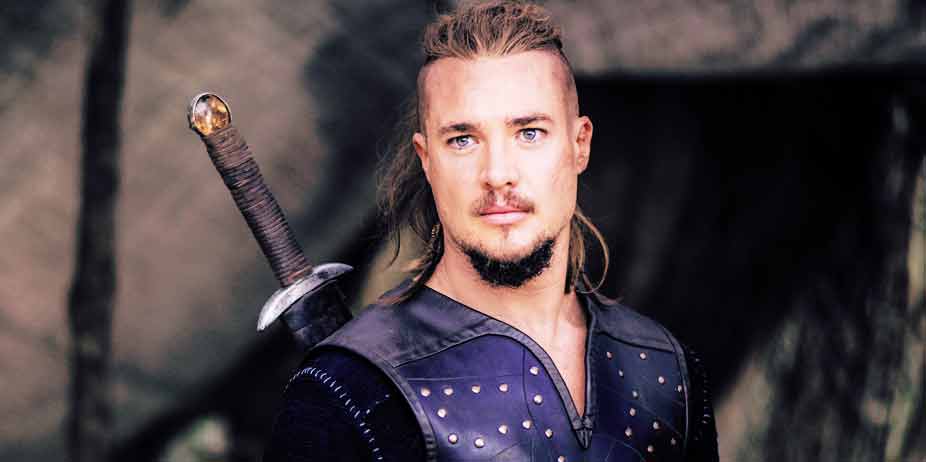 The
Last Kingdom, Season One (2015)
The
Last Kingdom, Season One (2015)
Based on a best-selling book series, and covering the first two novels in the saga, The Last Kingdom focuses on the conflict between the Danes and the English landowners, under the leadership of the future Alfred the Great. A gritty but moving series, it follows the adventures of a fictional hero amid the turbulent birth pains of England as a single united kingdom.
Betrayed by his uncle after the death of his father, young Uhtred is taken prisoner by the Danes. Raised alongside them, steeped in their ways, and eager to prove himself, when a violent warlord takes vengeance for an earlier abuse and kills Uhtred's adopted family, he (Alexander Dreymon) seeks vengeance. His desire to avenge their murders, and reclaim his rightful inheritance places him in the path of Prince Alfred (David Dawson). A calculating man with a vision for a united England, Alfred sees great potential in Uhtred, but also distrusts his loyalties.
A pagan disinterested in adopting the Catholicism of the time, Uhtred falls into Alfred's service for a time... hoping it will lead him nearer to wealth and privilege. Through conflict and adversity, manipulation and betrayal, the two men find themselves at odds and occasionally as comrades in arms, against inward pressing Dane armies.
Since this series is based on a novel, it has a more philosophical and political approach to the period than other dramas focusing on similar conflicts. It explores the belief systems of the time, the decreased respect for Paganism, the wealth and in some instances, abuses of the Church, and the blind devotion of the masses. Characters are allowed to hold conflicting belief systems, and explore their own morality and principles; Alfred, for example, struggles between sinful sexual desires and his wish to be a godly monarch. It touches on, but doesn't completely explore, one Viking warlord's gradual interest in Christianity, while not underplaying the fact that his eventual conversion is for personal gain (he believes God is indeed "with" the English, and desires Him as a powerful ally). As a result, many of the believers on screen show hypocritical tendencies, selfish inclinations, violence toward those of different belief systems, and antiquated blind loyalties -- which might be seen as an attack on Christianity in general, if it weren't a reasonable depiction of the religious beliefs of the middle ages. Let's not delude ourselves; most of history's "Christians" are nothing like Christ, either in thought process or deed.
As the series went on, I found myself more and more invested in these characters as individuals, and intrigued by the historical aspect. I've rarely seen a more interesting or accurate depiction of how the Danes went to war. The broad scope, the breathtaking landscape, and the frightening presence of the Dane armies creates a charismatic dynamic I've rarely seen on screen. The cast is wonderful, though Dawson steals most of the scenes he's in, without so much as lifting a finger. His calm, powerful presence suggests Alfred is more dangerous than his enemies realize. I regretted reaching the end of the eight episodes... and it left me not only wanting to read the novels, but research the period. That's usually the mark of a moving saga, even if I did wish it had shown a bit more restraint. Since the series refrains from foul language and isn't as gruesome as it could be, considering the period, the graphic sex scenes seem somewhat out of place.
Sexual Content:
Infrequent but graphic (movement, sounds). 3 instances of backside nudity; 4
scenes in which women are shown topless (including in sexual situations); five
explicit sex scenes; 1 graphic rape. Frequent sexual references ("plowing" and
"hump/humping" are used to describe sex). References to the king's tendency to
womanize.
Language:
One abuse of Christ's name.
Violence:
Tons of battle scenes. Men are skewered with swords.
Stabbed. Drawn to great heights and dropped on the floor. Burned alive. A man is
shot full of arrows, to emulate a Christian martyr on a painting on a church
wall. Battle scenes involve blood spurts, severed limbs (and heads) and rampant
carnage. A man has his calf muscles sliced open, and is then stabbed repeatedly.
Other:
Pagan magic. References to pagan gods. Uhtred and other
Vikings make frequent blasphemous and/or anti-Christian/Catholic statements.
Christians often have nothing to back up their beliefs. Priests are usually cast
in a negative, greedy light.
